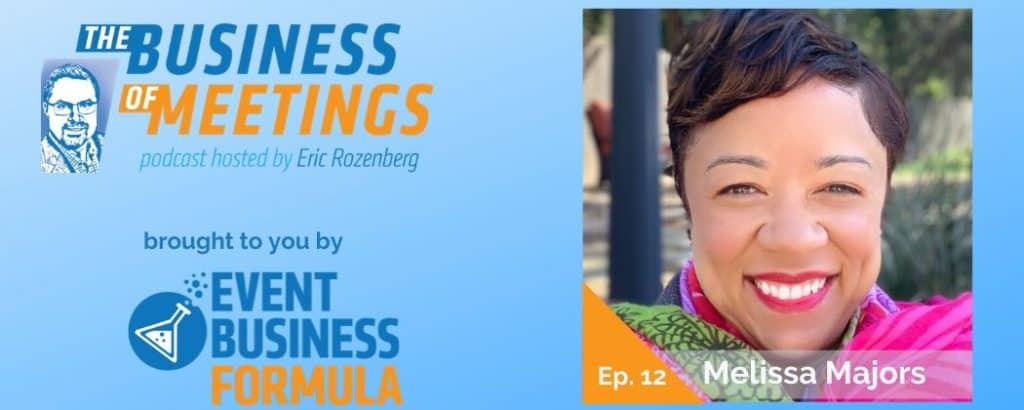
Today, we’re delighted to have Melissa Majors as our guest. Melissa is very bright and dynamic, and after having had an incredible career across several different fields within large organizations, she decided to step out on her own and start a business.
Melissa spent the majority of her career managing education organizations in a variety of industries, from financial services to technology, non-profit associations, and professional services.
Melissa launched her business, Melissa Majors Consulting, about a year ago. Now, she’s creating brain-friendly information. And, although her field of expertise is very broad, she’s decided to focus on strategic planning and inclusivity.
Not making a difference
Towards the end of her career, Melissa noticed that a lot of the training that she and her team were providing was not making any real difference because even though their audience seemed to be engaged, their brains were unplugged.
Becoming brain-friendly
Melissa then realized that if she wanted to be good at educating others, she needed to understand how the brain is wired to learn and pay attention. So she spent years studying neuroscience to master how to deliver a presentation in a brain-friendly way that would allow people to remember what she had said and to apply the information that she had shared.
The “forget factor”
People tend to forget ninety percent of all the new information that they learn at events because they are usually overloaded with information that they’re not able to remember and then apply.
Some tips from Melissa to help you remember new information
Most people can only pay attention to a presentation for ten minutes.
So when you’re exposed to new information, first ask yourself what the information truly means to you, and then ask yourself how you can apply it to your life. That is a brain-hack that will allow you to apply your context to the new information, and it will inform your brain that you need to remember it. In that way, the information will be stored in your long-term memory, rather than going in one ear, and straight out of the other.
A good tip for presenters is that the more you’re able to tell stories, the more likely you are to get people’s attention.
How our brains work
Our brains are constantly scanning the environment for opportunities for survival and threats. And our brains will only allow us to focus on anything other than that for about ten minutes. By telling stories, however, we get people’s brains to start paying attention.
Delivering information in a brain-friendly way
When delivering a presentation, you have only about ten minutes after telling your story to deliver more detailed information before people’s brains start shutting off. So chunk your presentation down into ten-minute segments, kick each segment off with a story that creates the context for what you’re going to talk about, and do that every ten minutes to involve your audience in a brain-friendly way, so that they will comprehend and remember what you say.
Keep the number of words on a slide to a bare minimum
When delivering a slide presentation, Melissa advises people to use pictures rather than bullet points, if possible. And if you’re going to use words on a slide, don’t use any more than a tweet’s worth because our brains process each character as a separate image.
We’re visual creatures and our brains are wired to look for threats visually, so great images that set the context for your message, with just a little text, will increase people’s attention and comprehension by forty percent.
Melissa teaches others how to deliver brain-friendly presentations
Melissa has an online course, called Mesmerize, The Art of Brain-Friendly Presentation. This course is available on her website. It’s a 15-minute course that breaks down both the design and the delivery of brain-friendly presentations.
She has also launched a product called Community Keynotes. With that service, she helps coach amateur speakers on how to deliver brain-friendly presentations in a keynote-worthy way.
Inclusivity
Simply put, inclusivity means involving others. And recent research has proven that the most inclusive companies are more innovative than others.
Melissa’s secret to success is that she includes people, and she asks them about their opinions. She includes all stakeholders, from senior leaders to people down the supply chain, to customers, and she blends all their ideas into solutions and strategies. And that leads to innovation.
Consulting with companies
When consulting with companies, Melissa helps them to gather the voices of all their stakeholders and aggregate that data into a story that then informs the solutions and strategies.
This allows companies to create data-driven strategies, rather than opinion-driven strategies.
She has also learned that when it comes to sharing, the leaders should speak last.
Making the leap
Melissa reached a point in her career when she knew that it was time to take the next step. She either had to move onto another organization and keep growing, or she could start her own business.
She had met some incredible entrepreneurs who were living their purpose and their calling, so she decided to seize the opportunity and go out on her own.
Making the leap was a big decision for her. However, the freedom that it has given her to help more people outside of the confines of an organization has allowed her to feel that she’s living her purpose and her calling. Although it can be scary at times, she feels that it’s worth it and she loves it!
Being creative and diversifying has got her through the rough patches.
Partnership
Social connection is as important as food, shelter, and water. Melissa has joined with four other women, who are also industry leaders, to form a partnership called The Five Points of Light. Together, they capitalize on collaboration, versus competition, and they pool their power to help and support one another and their extended networks. This support network has helped Melissa to get through some very difficult times.
Stress and mental health
Mental health is vital for everyone.
Dr. Sandy Chapman, the founder of the Brain Health Project at the Center For Brain Health, at the University of Texas in Dallas, has proven that stress effects on the brain are as damaging as smoking is to the lungs. She has developed a simple method to help people maintain their mental edge and improve their mental capacity and function.
Melissa’s advice
Melissa’s advice to everyone right now is to avoid making long-term decisions based on a short-term situation.
She reminds us that this pandemic situation will pass, and she has faith that when it’s over, we will all be better humans than we were before.
Melissa’s quotes:
“I’ve spent the majority of my career managing education organizations across a variety of industries.”
I realized that a lot of the training that my team and I were providing was not making a bit of difference.”
“If I was going to be good at educating others, I needed to understand how the brain was wired to learn and pay attention.”
“I’ve been studying neuroscience for years, to master how to deliver a presentation in a brain-friendly way.”
“We are often overloaded with information that we’re not able to remember and then apply.”
“As a presenter, the more you’re able to tell stories, the more likely you are to get people’s attention.”
Resources:
You can find us at www.eventbusinessformula.com
You can find us on Facebook at https://www.facebook.com/groups/thebusinessofmeetings/
The promo code for Melissa’s online course, Mesmerize, The Art of Brain-Friendly Presentation is BRAIN
Connect with Eric:
On LinkedIn
On Facebook
On Instagram
On Website
If you’d rather watch the video of this interview, subscribe on YouTube

